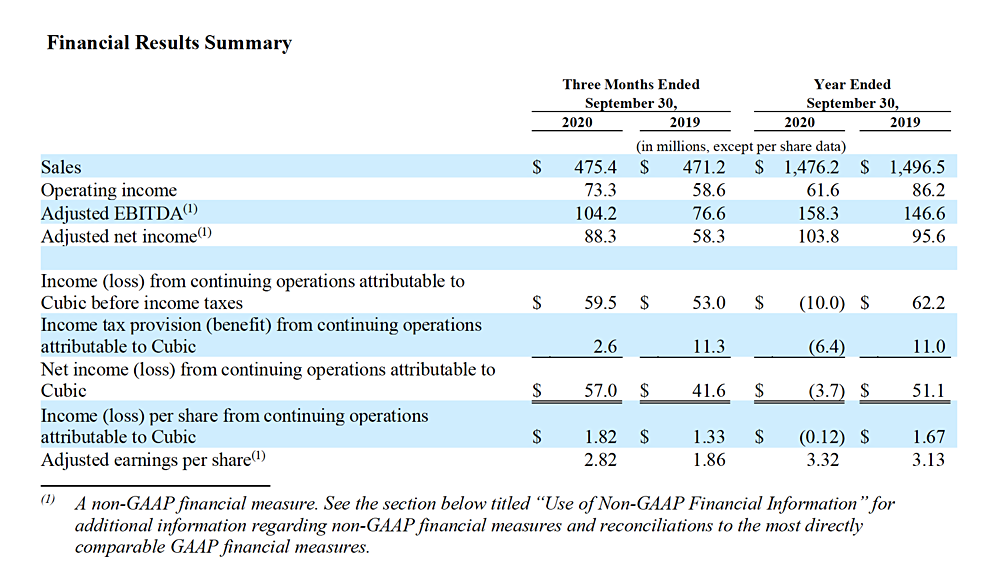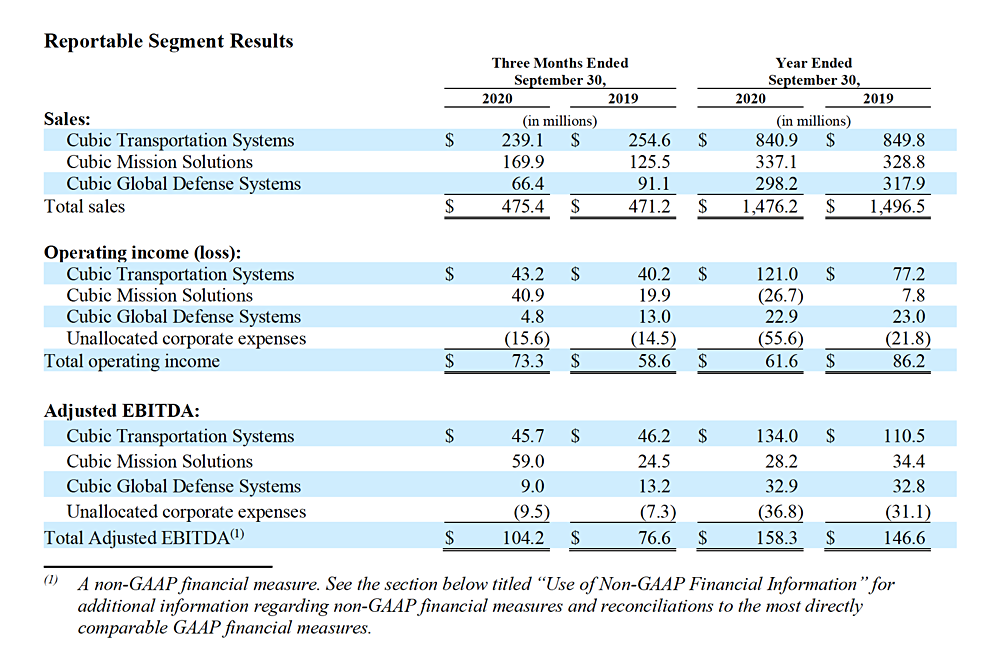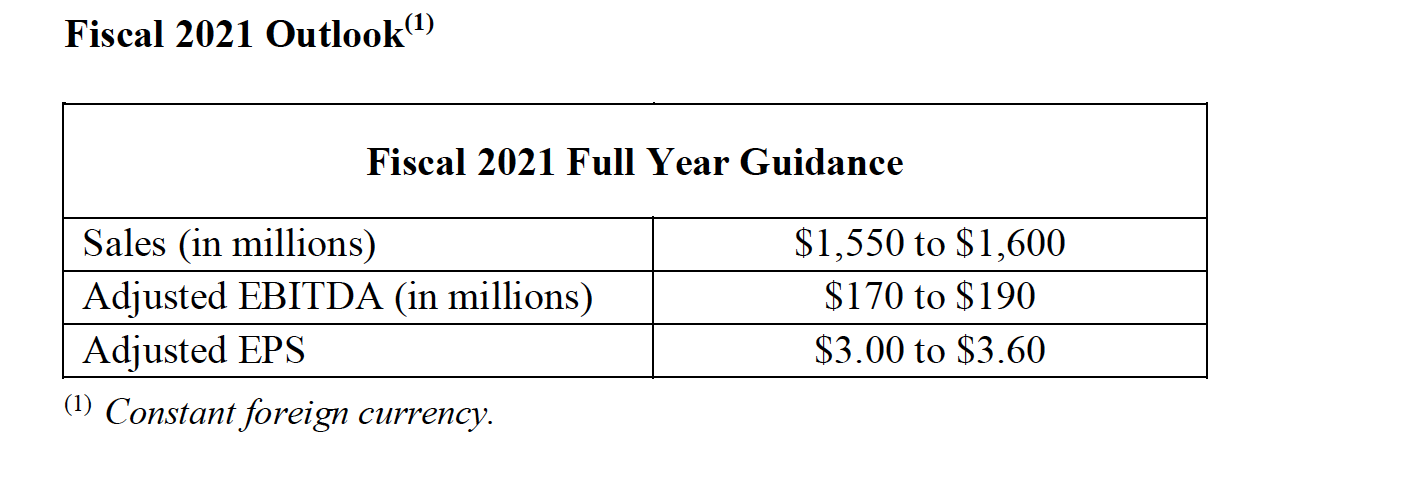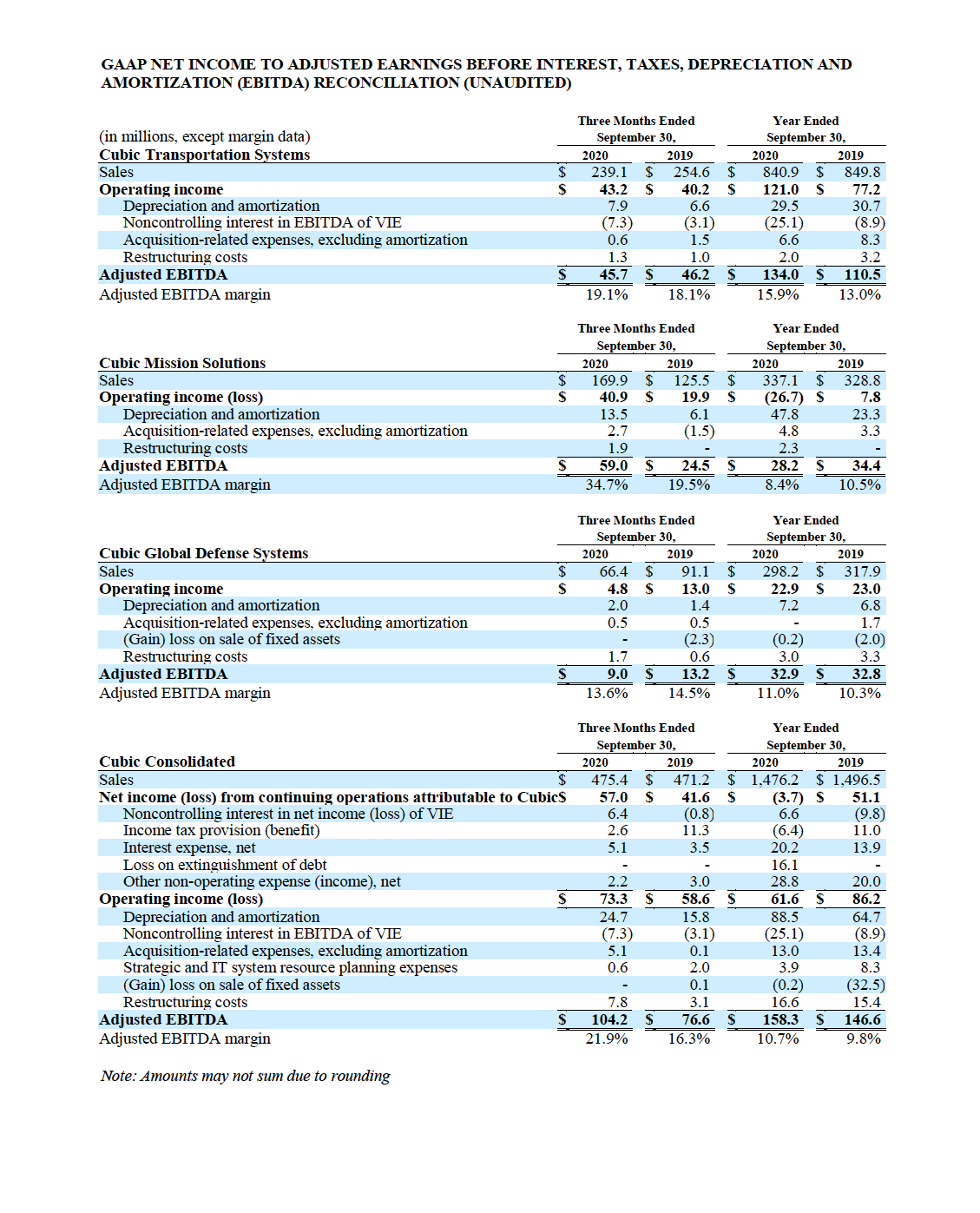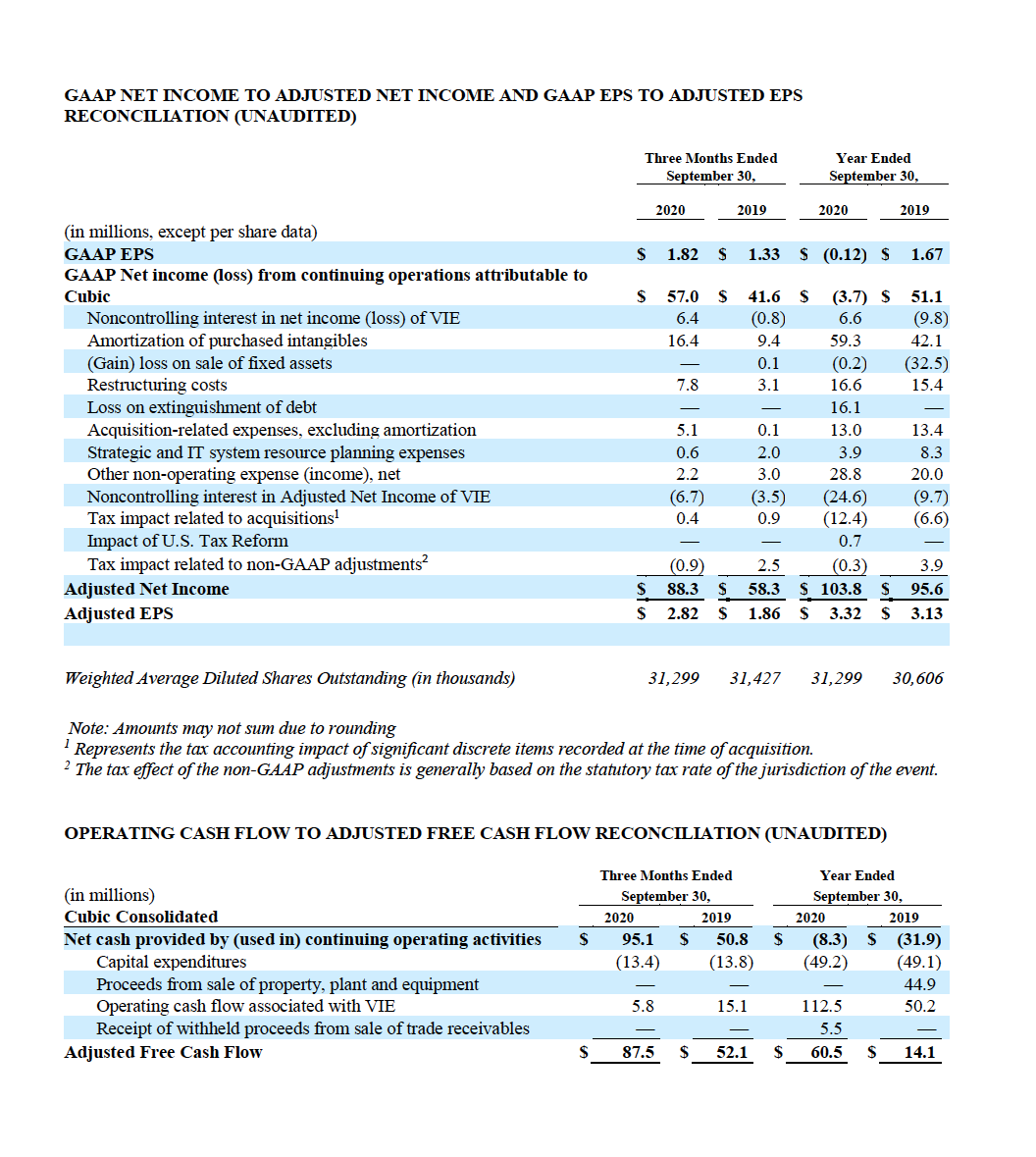SAN DIEGO – November 18, 2020 – Cubic Corporation (NYSE: CUB) (“Cubic” or the “Company”) today announced its financial results for the fourth quarter and fiscal year ended September 30, 2020.
Fiscal Fourth Quarter 2020 Highlights
- Record sales of $475.4 million, up 1% year-over-year
- Net income from continuing operations attributable to Cubic of $57.0 million, or $1.82 per share, compared to $41.6 million, or $1.33 per share, in the fourth quarter of fiscal 2019
- Adjusted earnings per share of $2.82, up 52% year-over-year
- Record fourth quarter Adjusted EBITDA of $104.2 million, up 36% year-over-year
- Net cash from operating activities of $95.1 million; Adjusted Free Cash Flow of $87.5 million
- Combined Cubic’s two defense business segments to drive customer value, operational effectiveness and cost savings
Full Year Fiscal 2020 Highlights
- Sales of $1.476 billion, down 1% year-over-year
- Net loss from continuing operations attributable to Cubic of $3.7 million, or $0.12 per share, compared to net income from continuing operations attributable to Cubic of $51.1 million, or $1.67 per share, in fiscal 2019; prior year included $32.5 million gain on sale of fixed assets
- Adjusted earnings per share of $3.32, up 6% year-over-year
- Record full year Adjusted EBITDA of $158.3 million, up 8% year-over-year; Adjusted EBITDA margin of 10.7% increased 90 basis points year-over-year
- Net cash used in operating activities of $8.3 million; Adjusted Free Cash Flow of $60.5 million
- Year-end backlog of $3.7 billion, up 8% year-over-year; book-to-bill ratio of 1.1 across all segments
- Announced guidance for Cubic’s fiscal year ending September 30, 2021: Sales of $1,550 to $1,600 million; Adjusted EBITDA of $170 to $190 million; Adjusted EPS of $3.00 to $3.60
“We ended the fiscal year on a strong note, delivering record fourth quarter Sales and Adjusted EBITDA and strong Adjusted Free Cash Flow,” said Bradley H. Feldmann, chairman, president and chief executive officer of Cubic Corporation. “We are grateful to our customers for their trust and to our employees for their unwavering commitment to delivering innovative, mission critical solutions, while safeguarding the well-being of their fellow CUBES. We are excited about the future as we embark on our recently announced NextCUBIC strategy, which we expect will drive strong organic sales growth and increase Adjusted EBITDA margins and return on invested capital to the mid-teens by fiscal 2025.”
Consolidated Fiscal Fourth Quarter 2020 Results
(all metrics compared to Fiscal Fourth Quarter 2019 unless otherwise noted)
Sales increased 1% as reported and decreased 4% on an organic basis to $475.4 million, compared to $471.2 million in the prior year period, reflecting strong growth in Mission Solutions and impacts related to the ongoing COVID-19 pandemic due to delayed orders and lower transit ridership.
Operating income was $73.3 million, compared to $58.6 million in the prior year period, reflecting an increase in operating income in Mission Solutions and Company-wide cost reduction initiatives.Operating margin of 15.4% increased 300 basis points.
Adjusted EBITDA increased 36% to $104.2 million, compared to $76.6 million in the prior year period, driven by Mission Solutions. Adjusted EBITDA margin of 21.9% increased 560 basis points.
Net income from continuing operations attributable to Cubic was $57.0 million, or $1.82 per share, compared to $41.6 million in the prior year period, or $1.33 per share, primarily reflecting higher operating income and a lower tax expense, which decreased by $8.8 million. Adjusted net income was $88.3 million, or $2.82 per share, compared to Adjusted net income of $58.3 million, or $1.86 per share, in the prior year period, primarily reflecting higher Adjusted EBITDA and lower tax expense.
Net cash provided by continuing operations increased to $95.1 million, including the impact of consolidating the Boston variable interest entity (“VIE”), compared to $50.8 million in the prior year period. Adjusted Free Cash Flow increased to $87.5 million, compared to $52.1 million in the prior year period.
Consolidated Fiscal Year 2020 Results
(all metrics compared to Fiscal Year 2019 unless otherwise noted)
Sales decreased 1% as reported and 3% on an organic basis to $1.476 billion, compared to $1.496 billion in fiscal 2019. The Company estimates that the COVID-19 pandemic negatively impacted Sales by up to $73 million during fiscal 2020 as a result of delayed orders and lower transit ridership.
Operating income was $61.6 million, compared to $86.2 million in fiscal 2019. Excluding the impact of a $32.5 million gain on sale of real estate in 2019, the change in operating income primarily reflects growth in Transportation Systems and Company-wide cost reduction initiatives, offset by an operating loss in Mission Solutions. Cubic’s consolidated VIE recognized higher operating income due to the Massachusetts Bay Transit Authority (“MBTA”) contract amendment. Operating margin of 4.2% decreased 160 basis points.
Adjusted EBITDA increased 8% to $158.3 million, compared to $146.6 million in fiscal 2019, driven by growth in Transportation Systems. The Company estimates that the COVID-19 pandemic negatively impacted Adjusted EBITDA by up to $28 million during fiscal 2020, which was partially offset by Company-wide cost reduction initiatives. Adjusted EBITDA margin of 10.7% increased 90 basis points.
Net loss from continuing operations attributable to Cubic was $3.7 million, or $0.12 per share, compared to net income from continuing operations attributable to Cubic of $51.1 million in fiscal 2019, or $1.67 per share, primarily reflecting lower operating income, a $16.1 million loss on extinguishment of debt and higher interest expense, which was partially offset by an income tax benefit of $6.4 million, compared to an income tax expense of $11.0 million in fiscal 2019.
Adjusted net income was $103.8 million, or $3.32 per share, compared to Adjusted net income of $95.6 million in fiscal 2019, or $3.13 per share, reflecting higher Adjusted EBITDA and lower taxes, partially offset by higher depreciation and interest expense.
Net cash used in continuing operations was $8.3 million, including the impact of consolidating the VIE, compared to $31.9 million in fiscal 2019. Adjusted Free Cash Flow increased to $60.5 million, compared to $14.1 million in fiscal 2019.
Cubic Transportation Systems (“CTS”)
Fourth quarter CTS sales decreased 6% as reported and 8% on an organic basis to $239.1 million, compared to $254.6 million in the prior year period. Full year sales decreased 1% both as reported and on an organic basis to $840.9 million compared to $849.8 million in fiscal 2019. Both fourth quarter and full year sales during fiscal 2020 were negatively impacted by COVID-19 due to delays of new awards and lower transit ridership.
Fourth quarter CTS Adjusted EBITDA decreased 1% to $45.7 million, compared to $46.2 million in the prior year period as the impact of lower sales was mostly offset by cost savings. Full year Adjusted EBITDA increased 21% to $134.0 million compared to $110.5 million in fiscal 2019. The increase in full year Adjusted EBITDA reflects the MBTA contract amendment, as well as strong execution on Services and cost savings, which offset certain unfavorable impacts related to COVID-19.
Cubic Mission Solutions (“CMS”)
Fourth quarter CMS sales increased 35% as reported and 21% on an organic basis to $169.9 million, compared to $125.5 million in the prior year period. Full year sales increased 3% as reported and decreased 6% on an organic basis to $337.1 million compared to $328.8 million in fiscal 2019. Both fourth quarter and full year sales reflect the acquisition of PIXIA Corp. (“PIXIA”) and growth from secure networks products, partially offset by lower deliveries of expeditionary satellite communications products, including delays related to COVID-19.
Fourth quarter CMS Adjusted EBITDA increased 141% to $59.0 million, compared to $24.5 million in the prior year period, primarily reflecting higher sales of secure network products and the impact of the acquisition of PIXIA. Full year Adjusted EBITDA decreased 18% to $28.2 million compared to $34.4 million in fiscal 2019, primarily driven by investments in franchise programs and higher research and development expense. The impacts were partially offset by the contribution of PIXIA.
Cubic Global Defense Systems (“CGD”)
Fourth quarter CGD sales decreased 27% as reported and 28% on an organic basis to $66.4 million, compared to $91.1 million in the prior year period. Full year sales decreased 6% both as reported and on an organic basis to $298.2 million compared to $317.9 million in fiscal 2019. Both the fourth quarter and full year reflect lower sales in ground training due to delays in new awards and exercise delays, primarily due to COVID-19.
Fourth quarter CGD Adjusted EBITDA decreased 32% to $9.0 million, compared to $13.2 million in the prior year period, reflecting lower sales. Full year Adjusted EBITDA was essentially flat at $32.9 million compared to $32.8 million in fiscal 2019 with strong cost management offsetting lower sales.
Backlog
Backlog of $3.667 billion increased $266.0 million year-over-year. Foreign currency had a favorable impact of $62.2 million during the period.
Fiscal Fourth Quarter 2020 Key Orders
(awards for unfunded indefinite delivery, indefinite quantity contracts are not recognized in backlog until the customer places a firm order; amounts shown for the bookings below do not include the value of unexercised options)
CTS
- $27 million to provide maintenance services to Metropolitan Atlanta Rapid Transit Authority
- $30 million for Cubic NextBus to provide real-time bus and train arrival times
- $25 million to provide intelligent traffic management systems for multiple customers
CMS
- $38 million to deliver High Capacity Backbone prototype for the U.S. Air Force
- $36 million across multiple customer orders for DTECH and other secure networking products
- PIXIA award to continue providing commercial software for data management and dissemination to the National Geospatial-Intelligence Agency
- Advanced Battle Management System multiple award, indefinite delivery indefinite quantity (“IDIQ”) with a ceiling of $950 million for the U.S. Air Force
- Follow-on, single-award, IDIQ with a ceiling of $172 million to deliver GATR inflatable SATCOM terminals and baseband communications equipment in support of U.S. special operations forces communications requirements
CGD
- $19 million to provide Urban Operations Training Solution and support for customer in Oceania
- $8.5 million second order in support of the Interim Joint Secure Interoperable Live-Virtual-Constructive and Secure Live Virtual Constructive Advanced Training Environment – Advanced Technology Demonstration for continued technology maturation and demonstration
- First two task orders received in support of U.S. Navy Surface Training Immersive Gaming and Simulations (single award, $99 million IDIQ)
Business Realignment
As previously announced in August 2020, the Company combined its CMS and CGD business segments to form Cubic Defense to advance its strategic priorities and enhance operational effectiveness. Commencing in the first quarter of fiscal 2021, Cubic will report its results under two business segments: CTS and Cubic Defense. Pro forma financials for Cubic Defense are included in the Company’s fourth quarter earnings presentation located in the Investor Relations section of the Company’s website: https://www.cubic.com/investor-relations.
Balance Sheet and Liquidity
Cubic’s bank net leverage ratio, as defined in the Company’s credit agreement, was 3.4x at quarter end. The credit agreement allows for net leverage of up to 4.75x through December 2020 and 4.0x beginning in the second quarter of fiscal 2021. Cubic remains focused on lowering net leverage to its target of below 3.0x in future periods. Cubic believes it currently has ample liquidity to navigate the evolving economic conditions surrounding COVID-19.
Conference Call and Webcast Information
Date: November 18, 2020
Time: 5:00 p.m. ET
Hosts: Bradley H. Feldmann, Chairman, President and Chief Executive Officer
Anshooman Aga, Executive Vice President and Chief Financial Officer
Dial in: 833-968-2299
778-560-2777 (international)
Conference ID 4459744
Webcast: https://event.on24.com/wcc/r/2633778/28CFCBC10748C62E42F1CA5841A1FF2A
An archive of the webcast will be made available on the Investor Relations section of the Company’s website: https://www.cubic.com/investor-relations/earnings.
About Cubic Corporation
Cubic is a technology-driven, market-leading provider of integrated solutions that increase situational understanding for transportation, defense C4ISR and training customers worldwide to decrease urban congestion and improve the militaries’ effectiveness and operational readiness. Our teams innovate to make a positive difference in people’s lives. We simplify their daily journeys. We promote mission success and safety for those who serve their nation. For more information about Cubic, please visit www.cubic.com or on Twitter @CubicCorp.
Investor Contact
Kirsten Nielsen
Investor Relations
Cubic Corporation
Kirsten.Nielsen@cubic.com
Media Contact
Christina Itzkowitz
Corporate Communications
Cubic Corporation
Christina.Itzkowitz@cubic.com
Forward-Looking Statements
This press release contains forward-looking statements within the meaning of the Private Securities Litigation Reform Act of 1995 (the “Act”) that are subject to the safe harbor created by the Act. Forward-looking statements include, among others, statements about Cubic’s expectations regarding future events or its future financial and operating performance and delivering on its strategic growth plan. These statements are often, but not always, made through the use of words or phrases such as “may,” “will,” “anticipate,” “estimate,” “plan,” “project,” “continuing,” “ongoing,” “expect,” “believe,” “intend,” “predict,” “potential,” “opportunity” and similar words or phrases or the negatives of these words or phrases. These statements involve risks, estimates, assumptions and uncertainties that could cause actual results to differ materially from those expressed in these statements, including, among others: the impact of the COVID-19 outbreak or future epidemics or pandemics on Cubic’s business, financial condition and operating results; Cubic’s dependence on U.S. and foreign government contracts; delays in approving U.S. and foreign government budgets and cuts in U.S. and foreign government defense expenditures; the ability of certain government agencies to unilaterally terminate or modify Cubic’s contracts with them; Cubic’s assumptions covering behavior by public transit authorities; Cubic’s ability to successfully integrate recently acquired companies, including Trafficware, GRIDSMART, Nuvotronics, Delerrok and PIXIA, into its business and to properly assess the effects of such integration on its financial condition and operating results; the U.S. government’s increased emphasis on awarding contracts to small businesses, and Cubic’s ability to retain existing contracts or win new contracts under competitive bidding processes; negative audits by the U.S. government; the effects of politics and economic conditions on negotiations and business dealings in the various countries in which Cubic does business or intends to do business; competition and technology changes in the defense and transportation industries; the change in the way transit agencies pay for transit systems; Cubic’s ability to accurately estimate the time and resources necessary to satisfy obligations under its contracts; the effect of adverse regulatory changes on Cubic’s ability to sell products and services; Cubic’s ability to identify, attract and retain qualified employees; unforeseen problems with the implementation and maintenance of Cubic’s information systems, including Cubic’s enterprise resource planning (“ERP”) system; business disruptions due to cyber security threats, physical threats, terrorist acts, acts of nature and public health crises (including COVID-19); Cubic’s involvement in litigation, including litigation related to patents, proprietary rights and employee misconduct; Cubic’s reliance on subcontractors and on a limited number of third parties to manufacture and supply its products; Cubic’s ability to comply with its development contracts and to successfully develop, introduce and sell new products, systems and services in current and future markets; defects in, or a lack of adequate coverage by insurance or indemnity for, Cubic’s products and systems; and changes in U.S. and foreign tax laws, exchange rates or Cubic’s economic assumptions regarding its pension plans. In addition, please refer to the risk factors contained in Cubic’s filings with the Securities and Exchange Commission (the “SEC”) available at www.sec.gov, including Cubic’s most recent Annual Report on Form 10-K for its fiscal year ended September 30, 2020 and subsequent Quarterly Reports on Form 10-Q. Because the risks, estimates, assumptions and uncertainties referred to above could cause actual results or outcomes to differ materially from those expressed in any forward-looking statements, you should not place undue reliance on any forward-looking statements. Any forward-looking statement speaks only as of the date of this press release, and, except as required by law, Cubic undertakes no obligation to update any forward-looking statement to reflect events or circumstances after the date of this press release.
Use of Non-GAAP Financial Information
In addition to results reported under U.S. generally accepted accounting principles (“GAAP”), Cubic provides certain financial measures that are not prepared in accordance with GAAP. These non-GAAP measures consist of organic sales growth, Adjusted net income, Adjusted earnings per share (“Adjusted EPS”), Adjusted EBITDA and Adjusted Free Cash Flow. Cubic believes that these non-GAAP measures provide additional insight into its ongoing operations and underlying business trends, facilitate a comparison of its results between current and prior periods, and facilitate the comparison of its operating results with the results of other public companies that provide non-GAAP measures. Cubic uses Adjusted EBITDA internally to evaluate the operating performance of its business, for strategic planning purposes, and as a factor in determining incentive compensation for certain employees. These non-GAAP measures facilitate company-to-company operating comparisons by excluding items that Cubic believes are not part of its core operating performance. Organic sales growth is defined as the year-over-year percentage change in reported sales relative to the prior comparable period, excluding the impact of acquisitions and divestitures over the prior 12 months and the impact of foreign currency translation. Adjusted EBITDA is defined as GAAP net income from continuing operations attributable to Cubic before interest expense, loss on extinguishment of debt, income taxes, depreciation and amortization, other non-operating expense, acquisition-related expenses, strategic and information technology (“IT”) system resource planning expenses, restructuring costs, and gains or losses on the disposal of fixed assets. Adjusted net income is defined as GAAP net income from continuing operations attributable to Cubic excluding amortization of purchased intangibles, restructuring costs, loss on extinguishment of debt, acquisition related expenses, strategic and IT system resource planning expenses, gains or losses on the disposal of fixed assets, other non-operating expense (income), tax impacts related to acquisitions, and the impact of the Tax Cuts and Jobs Act (“U.S. Tax Reform”). Adjusted EPS is defined as Adjusted net income on a per share basis using the weighted average diluted shares outstanding. Strategic and IT system resource planning expenses consists of expenses incurred in the development of Cubic’s ERP system and the redesign of its supply chain which include internal labor costs and external costs of materials and services that do not qualify for capitalization. Acquisition-related expenses include business acquisition expenses including retention bonus expenses, due diligence and consulting costs incurred in connection with the acquisitions, and expenses recognized related to the change in the fair value of contingent consideration for acquisitions.
Adjusted Free Cash Flow is defined as Net cash provided by continuing operations, excluding operating cash flow associated with the VIE in which Cubic has a 10% equity stake, less capital expenditures plus proceeds from the sale of fixed assets and the receipt of withheld proceeds from the sale of trade receivables. The VIE has contracted with Cubic for the design-build and operations and maintenance phases of the next-generation fare collection system for the MBTA and pays Cubic progress payments during the design-build phase of the project. These payments are primarily funded by non-recourse debt issued by the VIE. Additional information regarding the VIE can be found in Cubic’s Annual Report on Form 10-K for the fiscal year ended September 30, 2020 and its subsequent Quarterly Reports on Form 10-Q. Management believes that Adjusted Free Cash Flow is meaningful to investors because management reviews cash flows generated from operations after taking into consideration capital expenditures, which are necessary to maintain and expand Cubic’s business, in addition to the other adjustments noted above. Adjusted Free Cash Flow does not represent the residual cash flow available for discretionary expenditures since other non-discretionary expenditures are not deducted from the measure.
These non-GAAP measures are not measurements of financial performance under GAAP and should not be considered as measures of discretionary cash available to the Company or as alternatives to net income as a measure of performance. In addition, other companies may define these non-GAAP measures differently and, as a result, Cubic’s non-GAAP measures may not be directly comparable to the non-GAAP measures of other companies. Furthermore, non-GAAP financial measures have limitations as an analytical tool and you should not consider these measures in isolation, or as a substitute for analysis of Cubic’s results as reported under GAAP. Investors are advised to carefully review Cubic’s GAAP financial results that are disclosed in its filings with the SEC, including its Annual Report on Form 10-K for the fiscal year ended September 30, 2020 and its subsequent Quarterly Reports on Form 10-Q. With respect to the Company’s fiscal year 2021 Adjusted EBITDA and Adjusted EPS guidance, certain items that affect GAAP net income cannot be reasonably predicted as we are unable to quantify certain amounts that would be required to be included in the comparable forecasted GAAP measures without unreasonable effort. As such, we are unable to provide a reasonable estimate of GAAP net income or GAAP EPS, or a corresponding reconciliation of Adjusted EBITDA and Adjusted EPS guidance to GAAP net income or GAAP EPS for the full year. In addition, we believe such reconciliations would imply a degree of precision that would be confusing or misleading to investors.
Cubic reconciles organic sales growth to sales growth as reported, which it considers to be the most directly comparable GAAP financial measure. Cubic reconciles Adjusted EBITDA and Adjusted net income to GAAP net income, which it considers to be the most directly comparable GAAP financial measure. Cubic reconciles Adjusted EPS to GAAP EPS, which it considers to be the most directly comparable GAAP financial measure. Cubic reconciles Adjusted Free Cash Flow to Net cash provided by continuing operations, which it considers to be the most directly comparable GAAP financial measure. The following tables reconcile these non-GAAP measures to their most directly comparable GAAP financial measure:
